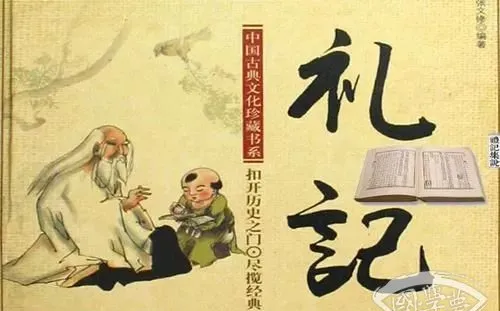The characteristic of Chinese culture is "etiquette". Its role is reflected in the two aspects of enhancing personal moral cultivation and cultivating national spirit. "Book of Rites" is a must-read book for ancient scholars, is an important canonical system book in ancient China, as a compilation of Confucian thought, the content of "Book of Rites" is all-encompassing, the text is vivid and fluent, and the beauty of Chinese etiquette is reflected between the lines!

01. "Etiquette is still reciprocal, and it is not polite to come and not to come; it is not to come and go, and it is not to be polite." ”
——Western Han Dai Sheng, "Li Ji Qu Li Shang"
Interpretation: Etiquette is expensive and comes and goes. Only the past and the absence or the coming and going are nothing more than courtesies. In the interaction between the state and the country, groups and groups, people and people, friends and friends, etiquette attaches great importance to comings and goings, and each other should adopt the same attitude and etiquette specifications, which is customarily called "etiquette and exchange".
02. "A gentleman does not lose his footing in people, does not lose his color in people, and does not lose his mouth in people." ”
Interpretation: Gentlemen should behave cautiously in front of others, be dignified, and not say the wrong thing and say things that should not be said. A few sentences can be used to persuade people to be careful in their words and deeds, not to say things that should not be said to people, and not to do things that should not be done, so as not to give people a handle and attract criticism.
03. Knowledgeable and strong, good deeds and not slack, called a gentleman.
- "Etiquette and Qu Lishang"
04. "The lover of a gentleman is also virtuous, and the lover of a delicate man is also appeased." ”
- "The Book of Rites and Bows"
Interpretation: A gentleman loves his lover according to the standard of virtue, and a villain loves a person to tolerate and indulge.
05. "In the upper position, not below; in the lower position, not in the upper position." If you are right for yourself and do not seek from others, you have no complaints. ”
——Western Han Dai Sheng, "Etiquette and Moderation"
Interpretation: A gentleman is in a superior position, does not act as a blessing, and bullies those who are in a lower position. In the lower position, do not bow down to the person in the upper position. If you correct your own actions and do not be harsh on others, then there will be no resentment.
06. "The journey of the avenue is also the public of the world." ”
--Western Han Dai Sheng, "Etiquette and Fortune"
Interpretation: "Dao" refers to the way followed in ancient times, and "the world is just" means that the world is everyone's, not unique to that person, that party, or that faction.
07. "The wise man respects him and fears and loves him." Love knows its evil, hate knows its good. ”
08. "Erudite and not poor, persevering and tireless." ”
Interpretation: Learning is endless, the accumulation of knowledge is endless; Always pay attention to words and deeds, and not slacken off!
09. "The benevolent make their fortunes, and the unkind make riches with their bodies." ”
——Xihan Daisheng, "Etiquette and University"
Interpretation: People with benevolence use wealth to develop and achieve themselves, and people without benevolence use their bodies and minds to accumulate wealth.
10. "Knowing deficiencies, then being able to reflexively also; knowing sleepiness, then being able to strengthen oneself also." ”
- "Etiquette and Learning"
Interpretation: Only when you realize that your knowledge is not enough, can you reflect on yourself; Only by realizing that you are confused about some knowledge can you strive for self-improvement.